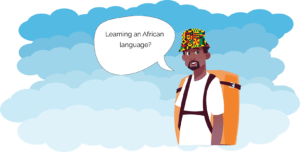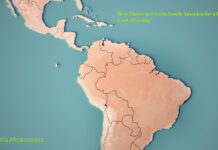Welcome to this publication about how to learn an African language easily for free, via Afrokonnect.
The African continent boasts of a diverse range of languages, most of these languages reflect the richness and uniqueness of Africa’s culture and history.
The act of learning various African languages is a potential gateway to unlocking Africa’s hidden identity, this is because each African language has a unique cultural legacy.
Although, the present age of global connectivity overlooks some African languages, it still remains an integral part of the African History.
Learning or the acquisition of some of these various African languages opens doors to meaningful exchanges with communities. This article will enable us embrace the diversity of our languages. We will also engage with the soul of Africa through the languages.
Cultural Benefits of learning an African Language
1. Appreciating our ancient culture:
Learning any African languages enable us comprehend cultures that were lost in the transition.
This helps fosters a deep understanding of local customs and values, which will in turn be passed down to the next generation.
2. Enhanced Cultural Exchange:
Being fluent in African languages helps us communicate comfortably with native speakers.
This enables the native speakers pass down relevant cultures that were hindered due to language barriers.
3) Access of ancient/traditional knowledge:
Many African languages are filled with stories and myths that contain numerous messages and are passed down from generation to generation.
Learning African languages will enable you have access to invaluable knowledge that form certain aspects of our culture.
Practical Benefits of learning an African Language
1) Effective Communication:
The act of learning an African language enables you communicate seamlessly with locals. This is helpful especially in business interactions and collaborations.
2) Genuine Travel Experience:
Travelers & Tourists that are familiar with the African language immerse themselves easily with local communities. This enables them gain insights and advice that are inaccessible to non-speakers.
3) Professional Opportunities:
Speakers of African languages can work in sectors such as diplomacy, international relations and journalism. The knowledge of various African languages can enhance a person’s job effectiveness.
4) Encourages Global Unity:
It helps break down stereotypes and fosters understanding between Africans and the outside world. This fosters an appreciation for Africa’s language diversity and enriches the world culture.
How to learn an African Language Easily for Free: A Comprehensive Guide
It is important to learn a new language as it helps to understand people’s culture. It also helps in connecting with various kinds of people and widens a person’s horizon.
To learn an African language is very enriching. The continent is home to various languages which aids a person’s in various ways. The act of learning an African language is very helpful to people from all works of life.
Whether you are interested in communicating fluently, travelling, business opportunities or just exploring; learning an African language will be very helpful. Here is a comprehensive guide on how to learn an African language:
1) Choose the Right Language:
African languages are very diverse so it is important you pick the one that’s most suitable for you. You must select a language that suits your interests and goals.
African languages are categorized in two types, which are:
- The widely spoken ones: Swahili & Hausa etc
- The lesser spoken ones: Zulu & Amharic etc
Factors such as the region you are visiting, availability of learning resources and your personal interests must be considered when learning a new language.
2) Set Clear Goals:
You must set clearly-defined goals when learning a new African language.
RECOMMENDED:
Goals such as achieving basic fluency, diving deep into the cultural understanding and building language skills must be outlined for you to set.
Setting these goals outlined above will help you structure your learning pattern and journey.
3) Immerse yourself with the language:
It is important you surround yourself with your chosen African language as much as possible.
For example: You must listen to music, watch movies and follow social media accounts that amplify your chosen African language. This helps in strengthening your skills in listening and comprehension passages.
4) Use Language Apps and Websites:
You can make use of language learning apps like Duolingo, Babbel, Memrise, Etc.
These apps and websites assists by offering structured lessons and interactive exercises. This helps in creating a gamified learning experience.
How to learn an African Language Easily for Free
5) Consistency:
It is not only important to learn an African language but learn it with a huge amount of dedication.
Dedicate a certain amount of time every day to learning your chosen African language. This will help you retain whatever you’ve learnt.
6) Join Learning Groups and Communities:
You must ensure that you connect with native speakers and online communities of your chosen African language.
Ensure you actively participate in discussions, language challenges and group activities as it will help boost you language skills.
It will also provide you with valuable insights into the cultural heritage of your chosen African language.
7) Learn Grammar and Structure:
Understand the fundamentals, rules and language structure of your chosen African language. You can begin with the basics and this will help give structure to your conservations.
8) Engage in Conservations with Native Speakers:
To boost your fluency in your chosen African languages, it is important you engage regularly with native speakers.
This will help in building your confidence and improve your fluency. This will also help you highlight your mistakes thus embracing corrections that will refine your grammar.
9) Embrace Mistakes:
It is essential that you get offended by the numerous mistakes you make. Making errors is an integral part of the learning process.
Errors will offer you another opportunity for improvement and highlight areas that need further improvement.
10) Use Flashcards and Visual Aids:
Using flashcards can also aid with your vocabulary. They will aid you with memory retention as the brain tends to be attracted more with images.
11) Celebrate Small Wins:
When learning a new African language, it will be very hard and successes will be at its minimal.
Ensure you celebrate milestones you overcome in your language journey.
Every new word or sentence you learn is a step towards your fluency in your chosen African language.
FAQs

We will be glad to answer some of your frequently asked questions:
What is the easiest African language to learn?
Determining the “easiest” African language to learn can be subjective and dependent on various factors like your native language, linguistic similarities, and personal preferences.
However, some commonly considered relatively easier African languages for English speakers include Swahili, Zulu, and Amharic.
These languages often have more accessible grammar structures and resources for learning.
How can I learn an African language for free?
Learning an African language for free can be achieved through various online resources, language exchange platforms, and mobile apps.
Websites like Duolingo, Memrise, and BBC Languages offer free language courses, including some African languages.
Additionally, platforms like Tandem and HelloTalk allow you to connect with native speakers for language exchange.
What is the hardest African language to learn?
The difficulty of learning a language is subjective and depends on factors such as your linguistic background, exposure, and personal aptitude.
However, languages with complex tonal systems and intricate grammar structures like Khoisan languages or languages from the Afroasiatic family such as Somali or Oromo might be considered more challenging.
What are the top 3 African languages?
The classification of the “top” African languages can vary based on different criteria such as the number of speakers, cultural significance, and international influence.
However, three languages that are often considered prominent are:
- Arabic: Due to its historical, cultural, and religious importance across North Africa and parts of East Africa.
- Swahili: Widely spoken across East Africa and used as a lingua franca in the region.
- French: While not exclusive to Africa, French is a major language in many African countries due to colonial history and continued influence.
Remember that language learning involves dedication, practice, and cultural understanding.
Whichever African language you choose to learn, taking small steps consistently can lead to meaningful progress.
How to learn an African Language Easily for Free
Conclusion
The process of learning an African language is a journey that goes beyond vocabulary and grammar.
It is about embracing various cultures and building numerous connections across different regions. By setting goals and following the steps listed above, you can embark on an adventure that will deepen your language skills.
It will also enrich your understanding on various African cultures and traditions. Thanks for reading an I hope to see you again on Afrokonnect.















